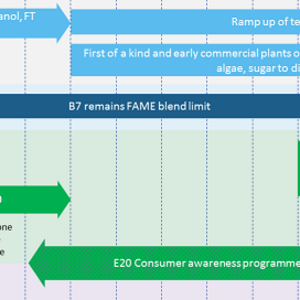Report evaluates role of biofuels in EU transport sector

Image: E4tech
December 4, 2013
BY Erin Krueger
Consulting firm E4tech has published a report that shows biofuels and vehicle efficiency will be essential in helping the European transportation sector reduce greenhouse gas (GHG) emissions and meet its decarbonization targets. The report, titled “A harmonised Auto-Fuel biofuel roadmap for the EU to 2030,” was commissioned by a consortium of Daimler, Honda, Neste, OMV, Shell and Volkswagen.
The report details what could be achieved in terms of a sustainable biofuel supply, and how that fuel can be integrated into the vehicle fleet. According to the study, biofuels could deliver a 12 to 15 percent energy contribution to transport fuel and 8 percent reduction in GHG emissions of the road transport sector by 2030. In addition, the analysis shows that advanced biofuels could grow to comprise at least 20 percent of the biofuels market by 2030, and that the potential for biofuels could be even greater beyond 2030.
The report makes several policy recommendations to support the use of biofuels and the decarbonization of transportation. First, the analysis calls for a coherent and overarching 2030 road transport policy to form the core of the European Union’s sustainable transport strategy. That framework should be based on sound evidence and include supporting measures for the development of required fuel and vehicle technologies and related infrastructure. The report also said the framework should be built on a roadmap for biofuels deployment and include a policy framework for sustainable feedstocks. In addition, the report specifies that advanced biofuels should play a major role and be supported by a dedicated funding program and initiatives enacted on the member state level. The policy should recognize the benefit of drop-in biofuels and include a program to ensure motorists have access to timely, accurate information to inform their purchasing decisions.
Advertisement
“There is a clear lack of understanding of what biofuels could accomplish in European road transport towards 2030. For the first time we have analyzed in detail what can be achieved in terms of sustainable biofuels supply—and critically, how this can be integrated affordably and smoothly into the vehicle fleet,” said Ausilio Bauen, director of E4tech. “On this basis we have set out a vision and roadmap of how the auto and fuel industries can jointly achieve a 15 percent energy contribution from biofuels by 2030. This will now require broader stakeholder and policy buy-in.”
A full copy of the study can be downloaded here.
Advertisement
Related Stories
Global digital shipbuilder Incat Crowther announced on June 11 the company has been commissioned by Los Angeles operator Catalina Express to design a new low-emission, renewable diesel-powered passenger ferry.
ATR and French SAF aggregator ATOBA Energy on June 19 signed a memorandum of understanding (MOU) to explore ways to facilitate and accelerate sustainable aviation fuel (SAF) adoption for ATR operators.
Argent Fuels, a leading provider of carbon-saving fuels in the UK, is accelerating its efforts to support a greener future. The expansion of its High Blend Biodiesel will supply to bus, coach, HGV fleets and rail in the south of the UK.
Sprague Operating Resources LLC on June 24 announced it has been selected by the New York City Department of Citywide Administrative Services to supply renewable diesel for its marine fleet, including the iconic Staten Island Ferry.
On June 17, the NYC Department of Citywide Administrative Services and the Department of Transportation announced the start of the Staten Island Ferry’s transition to renewable diesel, marked by the delivery of the first barge of fuel.
Upcoming Events










